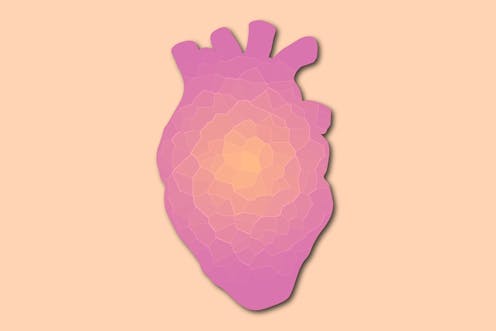Why is heart cancer so rare? A biologist explains
- Written by Julie Phillippi, Associate Professor of Cardiothoracic Surgery and Bioengineering, University of Pittsburgh

What protects heart cells from cancer?
Even though the heart is the first organ to form and start working[14] during early development, cells in the adult heart divide very few times after birth, with division dramatically declining after age 20[15]. In fact, less than 50% of heart cells[16] are replaced over the course of an average human life. That means half of the heart cells you’re born with will be helping pump blood for your entire life.
This low rate of cell division in the adult heart likely serves as its primary defense against cancer. The less often a cell divides, the fewer opportunities there are for mistakes during DNA replication.
The heart is also less directly exposed[19] to cancer-causing factors, such as UV light on the skin or inhaled substances in the lung, due to its protected location in the chest.
Unfortunately, the heart’s low rate of cell division has some downsides, such as a reduced ability to repair and replace cells damaged by disease, injury or aging.
Why heart cancer still happens
Even with the heart’s resistance to cancer, tumors may still form.
When cancer is found in the heart, it’s often the result of cancer cells migrating from another part of the body to the heart[20]. This process is called metastasis[21]. Certain types of skin cancers or cancers in the chest are more likely to spread to the heart, though this is still rare.
When they do happen, heart tumors can be quite serious and more aggressive than other cancers[22]. A study analyzing more than 100,000 heart cancer cases in the United States found that patients who underwent surgery and chemotherapy[23] to treat their heart cancer survived longer than those who did not.
Successful cancer care spans multiple areas of medicine. These include palliative care[24], which focuses on relieving pain and addressing symptoms, and integrative medicine[25], which considers the mind-body-spirit connection.
Heart cancer holds clues to heart regeneration
Understanding how heart cells divide and what causes that process to change offers clues about disease and shapes ideas for new treatments.
For example, research into how heart cells divide helps scientists better understand why the heart doesn’t heal well after a heart attack. Researchers found that although failing hearts have more dividing cells[26] than healthy hearts, they need help to recover fully.
New technologies, such as the ability to reprogram blood cells into heart cells, have allowed researchers to develop new heart disease models[27] to study and one day achieve heart regeneration. This opens doors for new treatments for heart diseases, including cancer.
Understanding why cancer doesn’t happen is just as important for developing new and better treatments as knowing why it does. The answers to both questions lie truly at the heart.
Hello, curious kids! Do you have a question you’d like an expert to answer? Ask an adult to send your question to CuriousKidsUS@theconversation.com[28]. Please tell us your name, age and the city where you live.
And since curiosity has no age limit – adults, let us know what you’re wondering, too. We won’t be able to answer every question, but we will do our best.
References
- ^ Curious Kids (theconversation.com)
- ^ CuriousKidsUS@theconversation.com (theconversation.com)
- ^ billions or even trillions of cells (doi.org)
- ^ doesn’t happen as often (doi.org)
- ^ 3 in 10,000 people (doi.org)
- ^ 1 in 20 women are expected to develop breast cancer (www.iarc.who.int)
- ^ I’m a biologist (scholar.google.com)
- ^ cell division (www.nature.com)
- ^ divide extremely fast (doi.org)
- ^ approximately every 10 years (doi.org)
- ^ molecular checkpoints (www.khanacademy.org)
- ^ OpenStax (openstax.org)
- ^ CC BY-SA (creativecommons.org)
- ^ first organ to form and start working (open.oregonstate.education)
- ^ dramatically declining after age 20 (doi.org)
- ^ less than 50% of heart cells (doi.org)
- ^ OpenStax (openstax.org)
- ^ CC BY-SA (creativecommons.org)
- ^ less directly exposed (openstax.org)
- ^ another part of the body to the heart (doi.org)
- ^ called metastasis (theconversation.com)
- ^ more aggressive than other cancers (doi.org)
- ^ surgery and chemotherapy (doi.org)
- ^ palliative care (theconversation.com)
- ^ integrative medicine (my.clevelandclinic.org)
- ^ failing hearts have more dividing cells (doi.org)
- ^ new heart disease models (doi.org)
- ^ CuriousKidsUS@theconversation.com (theconversation.com)
Authors: Julie Phillippi, Associate Professor of Cardiothoracic Surgery and Bioengineering, University of Pittsburgh
Read more https://theconversation.com/why-is-heart-cancer-so-rare-a-biologist-explains-256055

